Attribution Theory Impact on Organizational Processes Report
VerifiedAdded on 2019/10/09
|7
|1147
|173
Report
AI Summary
This report examines the influence of attribution theory on key organizational processes, specifically communication and change management. It explores how attribution theory enhances communication through participative decision-making, development programs, and fair reward systems. The report further analyzes how attribution theory aids in effective change management by improving managerial capacity, understanding human behavior, evaluating potential problems, and analyzing data. The study draws on various academic sources to support its conclusions, emphasizing the positive impact of attribution theory on organizational effectiveness. This report offers valuable insights into how organizations can leverage attribution theory to improve communication and successfully manage change initiatives. The report concludes that attribution theory positively influences both communication and organizational change processes by providing knowledge about the internal and external environment and behavior of human beings.
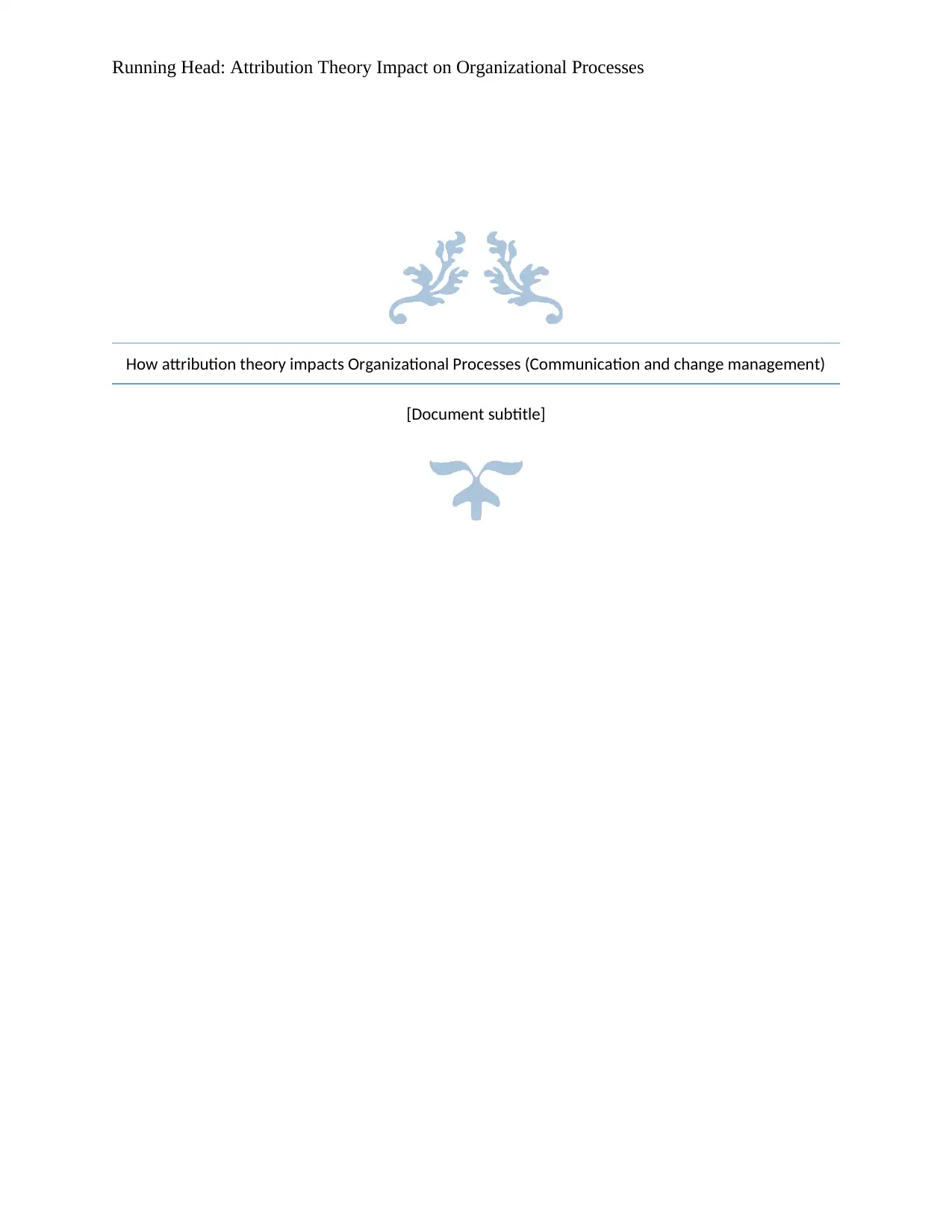
Running Head: Attribution Theory Impact on Organizational Processes
How attribution theory impacts Organizational Processes (Communication and change management)
[Document subtitle]
How attribution theory impacts Organizational Processes (Communication and change management)
[Document subtitle]
Paraphrase This Document
Need a fresh take? Get an instant paraphrase of this document with our AI Paraphraser
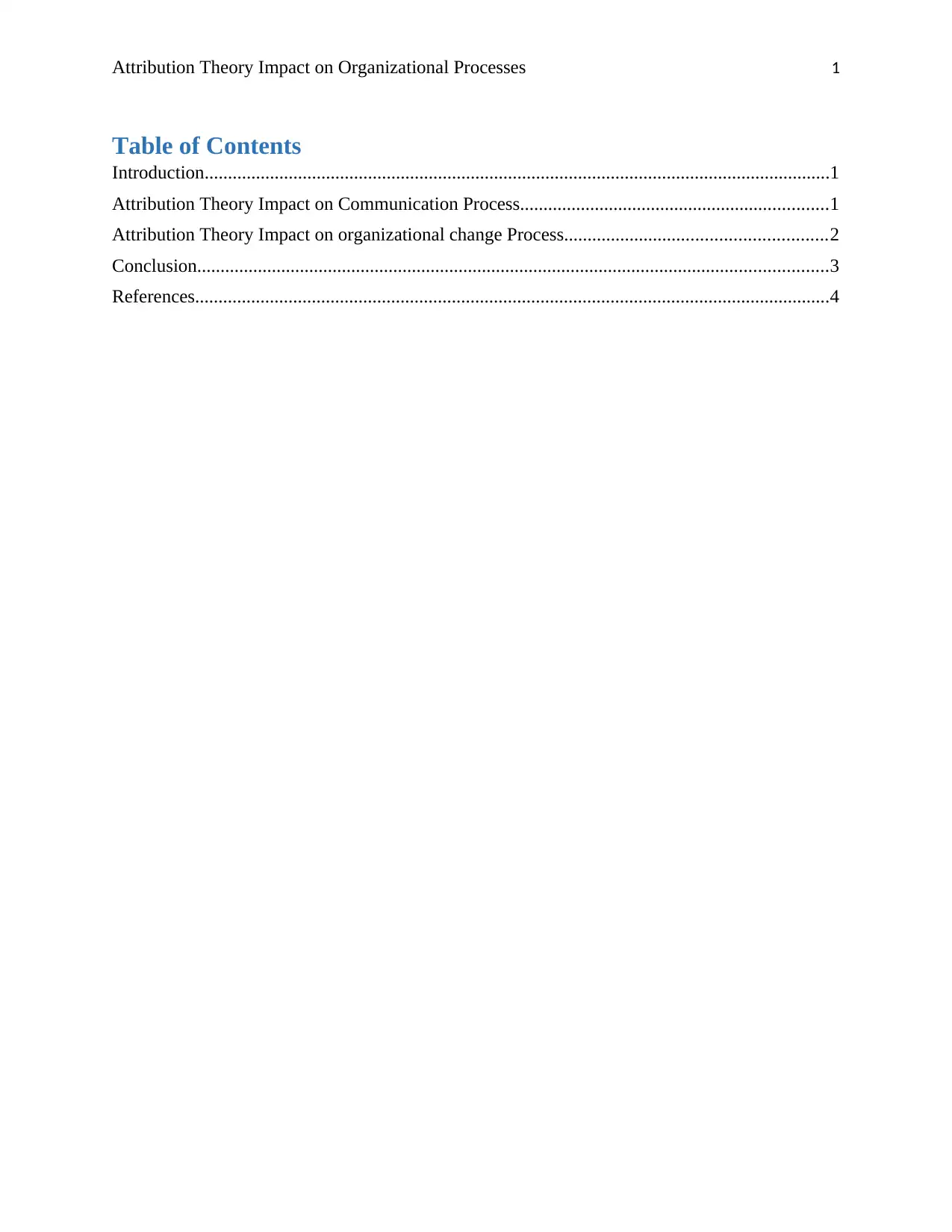
Attribution Theory Impact on Organizational Processes 1
Table of Contents
Introduction......................................................................................................................................1
Attribution Theory Impact on Communication Process..................................................................1
Attribution Theory Impact on organizational change Process........................................................2
Conclusion.......................................................................................................................................3
References........................................................................................................................................4
Table of Contents
Introduction......................................................................................................................................1
Attribution Theory Impact on Communication Process..................................................................1
Attribution Theory Impact on organizational change Process........................................................2
Conclusion.......................................................................................................................................3
References........................................................................................................................................4
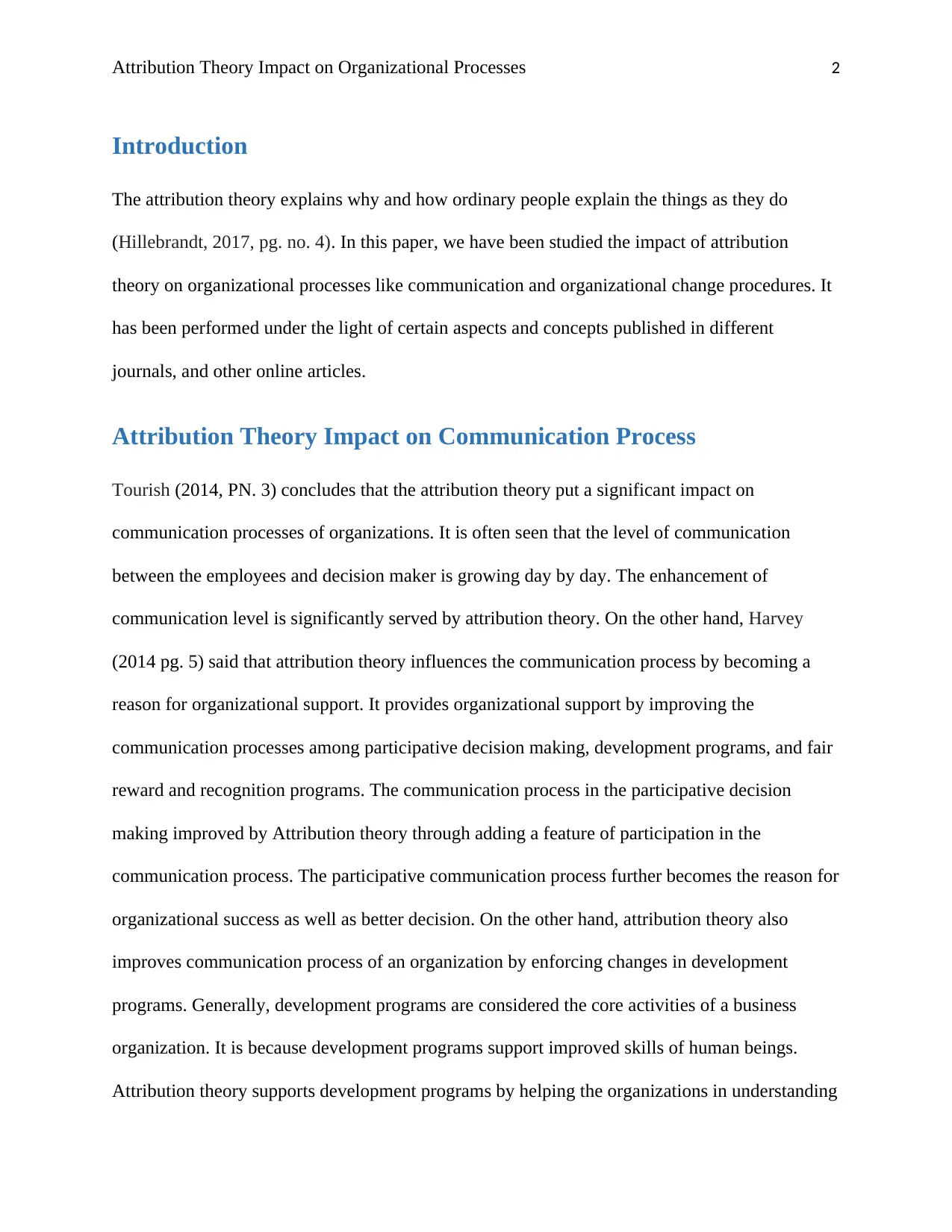
Attribution Theory Impact on Organizational Processes 2
Introduction
The attribution theory explains why and how ordinary people explain the things as they do
(Hillebrandt, 2017, pg. no. 4). In this paper, we have been studied the impact of attribution
theory on organizational processes like communication and organizational change procedures. It
has been performed under the light of certain aspects and concepts published in different
journals, and other online articles.
Attribution Theory Impact on Communication Process
Tourish (2014, PN. 3) concludes that the attribution theory put a significant impact on
communication processes of organizations. It is often seen that the level of communication
between the employees and decision maker is growing day by day. The enhancement of
communication level is significantly served by attribution theory. On the other hand, Harvey
(2014 pg. 5) said that attribution theory influences the communication process by becoming a
reason for organizational support. It provides organizational support by improving the
communication processes among participative decision making, development programs, and fair
reward and recognition programs. The communication process in the participative decision
making improved by Attribution theory through adding a feature of participation in the
communication process. The participative communication process further becomes the reason for
organizational success as well as better decision. On the other hand, attribution theory also
improves communication process of an organization by enforcing changes in development
programs. Generally, development programs are considered the core activities of a business
organization. It is because development programs support improved skills of human beings.
Attribution theory supports development programs by helping the organizations in understanding
Introduction
The attribution theory explains why and how ordinary people explain the things as they do
(Hillebrandt, 2017, pg. no. 4). In this paper, we have been studied the impact of attribution
theory on organizational processes like communication and organizational change procedures. It
has been performed under the light of certain aspects and concepts published in different
journals, and other online articles.
Attribution Theory Impact on Communication Process
Tourish (2014, PN. 3) concludes that the attribution theory put a significant impact on
communication processes of organizations. It is often seen that the level of communication
between the employees and decision maker is growing day by day. The enhancement of
communication level is significantly served by attribution theory. On the other hand, Harvey
(2014 pg. 5) said that attribution theory influences the communication process by becoming a
reason for organizational support. It provides organizational support by improving the
communication processes among participative decision making, development programs, and fair
reward and recognition programs. The communication process in the participative decision
making improved by Attribution theory through adding a feature of participation in the
communication process. The participative communication process further becomes the reason for
organizational success as well as better decision. On the other hand, attribution theory also
improves communication process of an organization by enforcing changes in development
programs. Generally, development programs are considered the core activities of a business
organization. It is because development programs support improved skills of human beings.
Attribution theory supports development programs by helping the organizations in understanding
⊘ This is a preview!⊘
Do you want full access?
Subscribe today to unlock all pages.

Trusted by 1+ million students worldwide
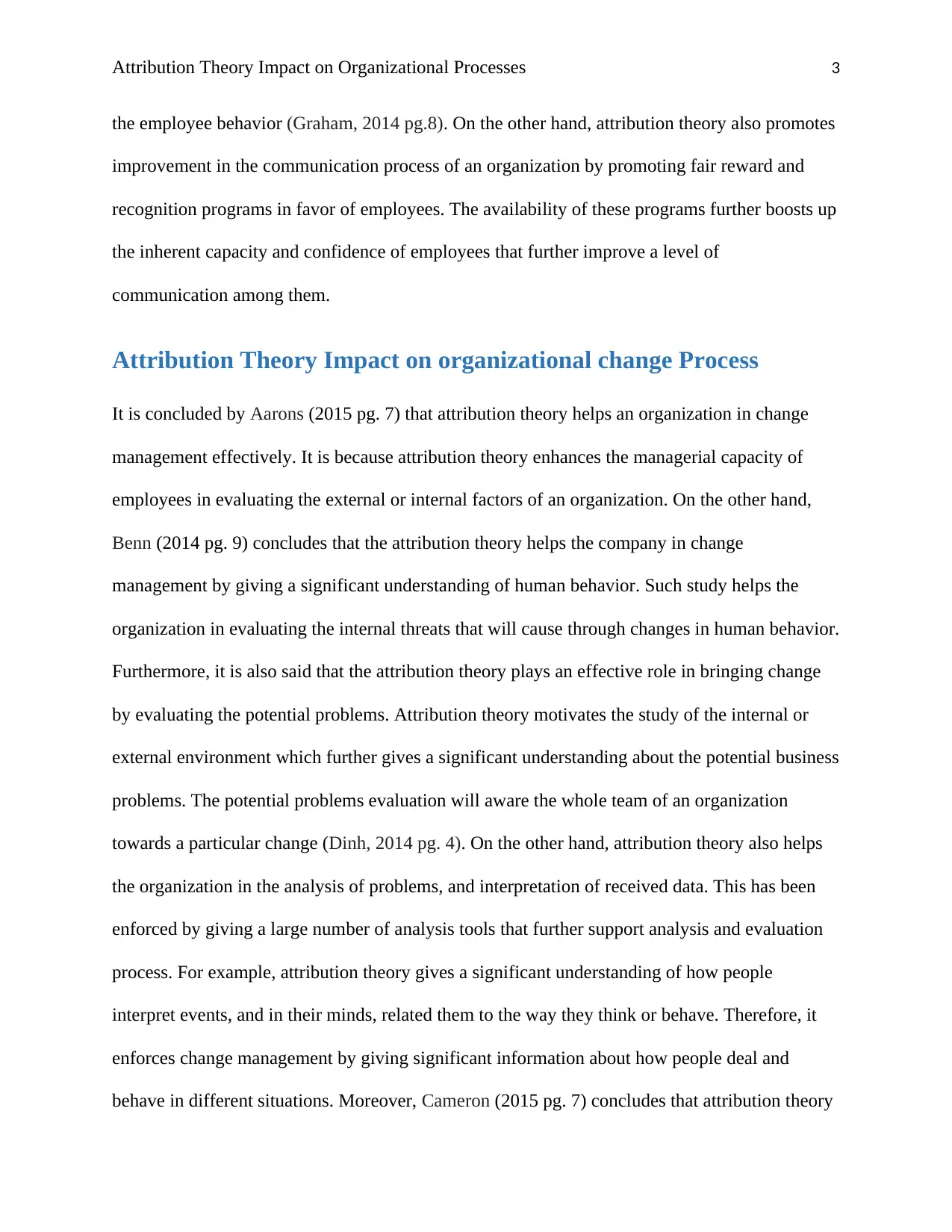
Attribution Theory Impact on Organizational Processes 3
the employee behavior (Graham, 2014 pg.8). On the other hand, attribution theory also promotes
improvement in the communication process of an organization by promoting fair reward and
recognition programs in favor of employees. The availability of these programs further boosts up
the inherent capacity and confidence of employees that further improve a level of
communication among them.
Attribution Theory Impact on organizational change Process
It is concluded by Aarons (2015 pg. 7) that attribution theory helps an organization in change
management effectively. It is because attribution theory enhances the managerial capacity of
employees in evaluating the external or internal factors of an organization. On the other hand,
Benn (2014 pg. 9) concludes that the attribution theory helps the company in change
management by giving a significant understanding of human behavior. Such study helps the
organization in evaluating the internal threats that will cause through changes in human behavior.
Furthermore, it is also said that the attribution theory plays an effective role in bringing change
by evaluating the potential problems. Attribution theory motivates the study of the internal or
external environment which further gives a significant understanding about the potential business
problems. The potential problems evaluation will aware the whole team of an organization
towards a particular change (Dinh, 2014 pg. 4). On the other hand, attribution theory also helps
the organization in the analysis of problems, and interpretation of received data. This has been
enforced by giving a large number of analysis tools that further support analysis and evaluation
process. For example, attribution theory gives a significant understanding of how people
interpret events, and in their minds, related them to the way they think or behave. Therefore, it
enforces change management by giving significant information about how people deal and
behave in different situations. Moreover, Cameron (2015 pg. 7) concludes that attribution theory
the employee behavior (Graham, 2014 pg.8). On the other hand, attribution theory also promotes
improvement in the communication process of an organization by promoting fair reward and
recognition programs in favor of employees. The availability of these programs further boosts up
the inherent capacity and confidence of employees that further improve a level of
communication among them.
Attribution Theory Impact on organizational change Process
It is concluded by Aarons (2015 pg. 7) that attribution theory helps an organization in change
management effectively. It is because attribution theory enhances the managerial capacity of
employees in evaluating the external or internal factors of an organization. On the other hand,
Benn (2014 pg. 9) concludes that the attribution theory helps the company in change
management by giving a significant understanding of human behavior. Such study helps the
organization in evaluating the internal threats that will cause through changes in human behavior.
Furthermore, it is also said that the attribution theory plays an effective role in bringing change
by evaluating the potential problems. Attribution theory motivates the study of the internal or
external environment which further gives a significant understanding about the potential business
problems. The potential problems evaluation will aware the whole team of an organization
towards a particular change (Dinh, 2014 pg. 4). On the other hand, attribution theory also helps
the organization in the analysis of problems, and interpretation of received data. This has been
enforced by giving a large number of analysis tools that further support analysis and evaluation
process. For example, attribution theory gives a significant understanding of how people
interpret events, and in their minds, related them to the way they think or behave. Therefore, it
enforces change management by giving significant information about how people deal and
behave in different situations. Moreover, Cameron (2015 pg. 7) concludes that attribution theory
Paraphrase This Document
Need a fresh take? Get an instant paraphrase of this document with our AI Paraphraser
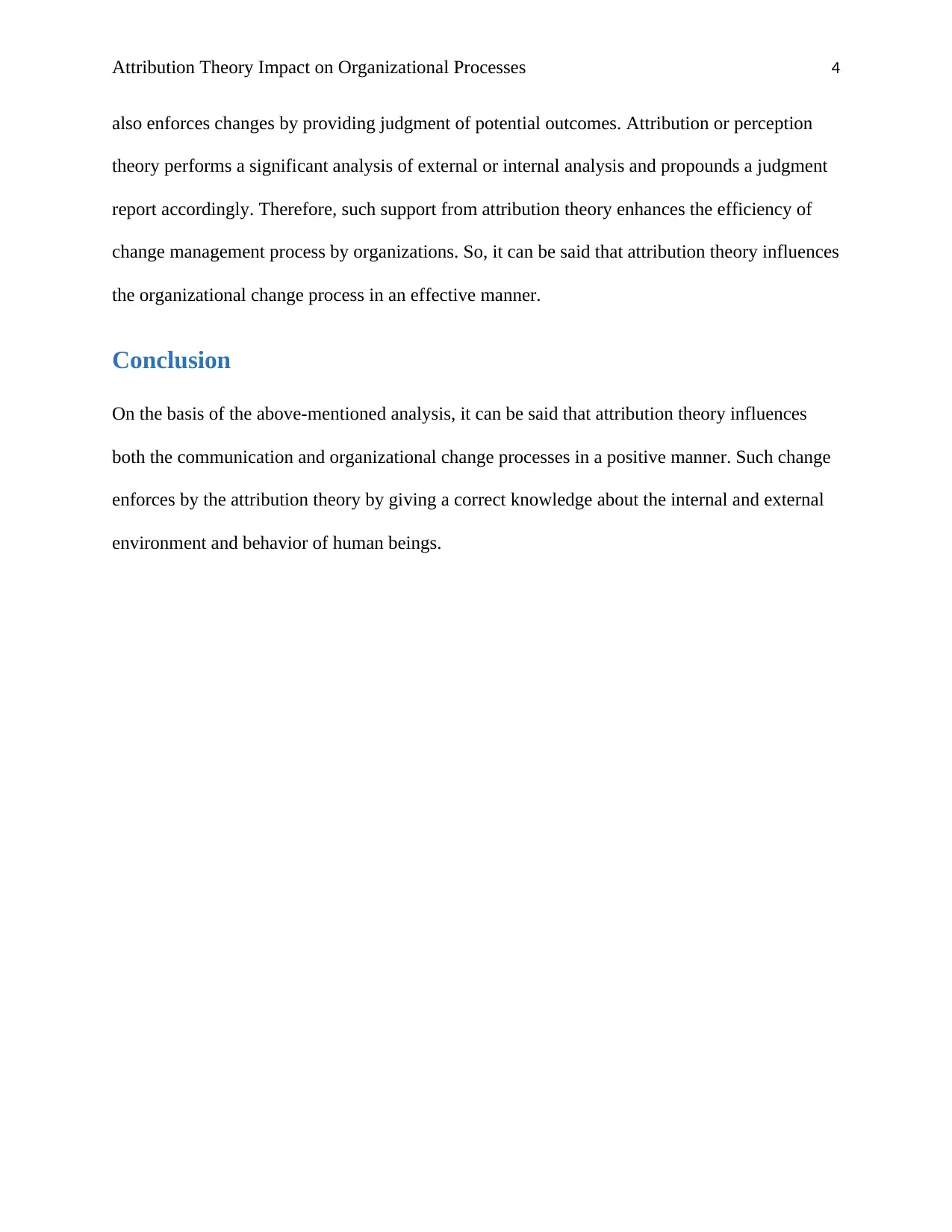
Attribution Theory Impact on Organizational Processes 4
also enforces changes by providing judgment of potential outcomes. Attribution or perception
theory performs a significant analysis of external or internal analysis and propounds a judgment
report accordingly. Therefore, such support from attribution theory enhances the efficiency of
change management process by organizations. So, it can be said that attribution theory influences
the organizational change process in an effective manner.
Conclusion
On the basis of the above-mentioned analysis, it can be said that attribution theory influences
both the communication and organizational change processes in a positive manner. Such change
enforces by the attribution theory by giving a correct knowledge about the internal and external
environment and behavior of human beings.
also enforces changes by providing judgment of potential outcomes. Attribution or perception
theory performs a significant analysis of external or internal analysis and propounds a judgment
report accordingly. Therefore, such support from attribution theory enhances the efficiency of
change management process by organizations. So, it can be said that attribution theory influences
the organizational change process in an effective manner.
Conclusion
On the basis of the above-mentioned analysis, it can be said that attribution theory influences
both the communication and organizational change processes in a positive manner. Such change
enforces by the attribution theory by giving a correct knowledge about the internal and external
environment and behavior of human beings.
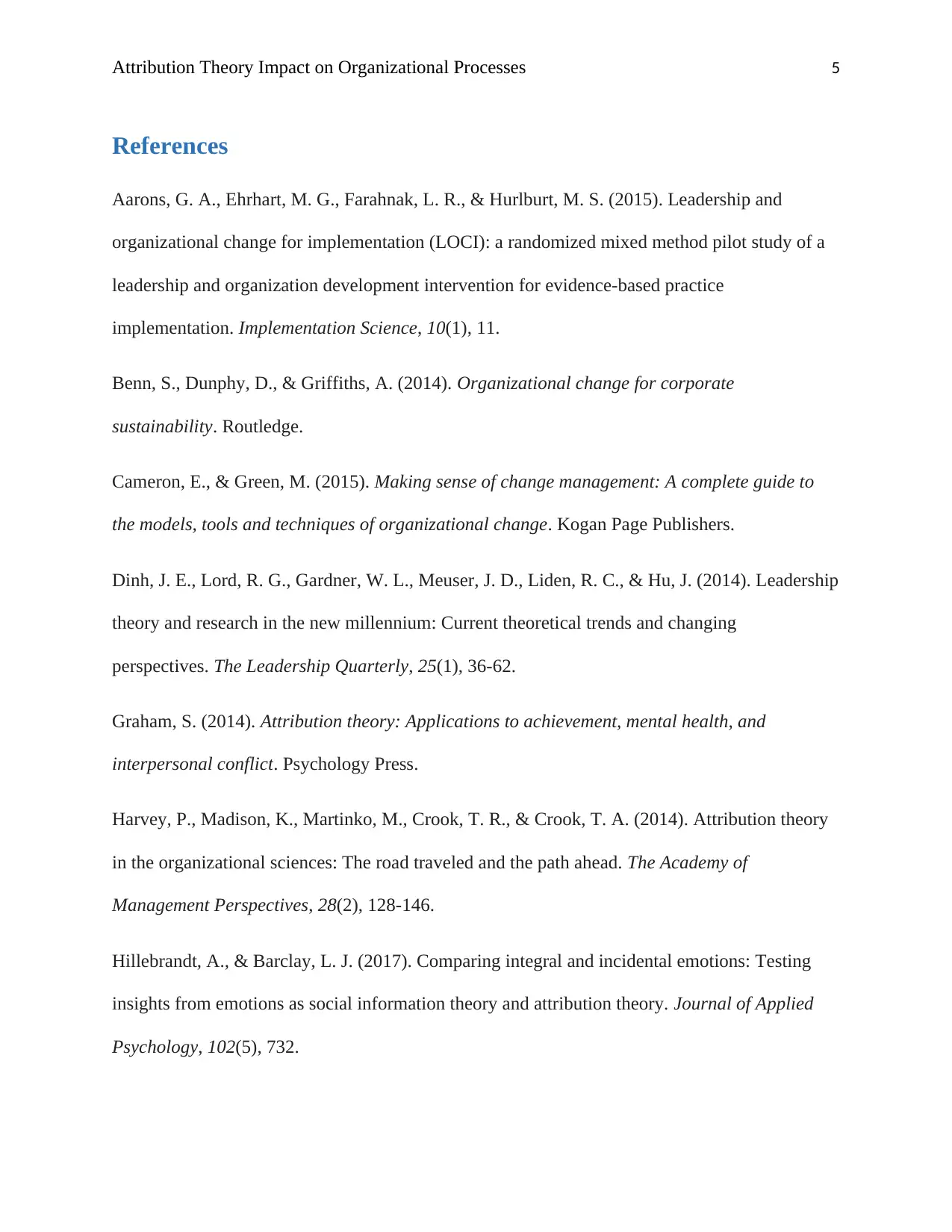
Attribution Theory Impact on Organizational Processes 5
References
Aarons, G. A., Ehrhart, M. G., Farahnak, L. R., & Hurlburt, M. S. (2015). Leadership and
organizational change for implementation (LOCI): a randomized mixed method pilot study of a
leadership and organization development intervention for evidence-based practice
implementation. Implementation Science, 10(1), 11.
Benn, S., Dunphy, D., & Griffiths, A. (2014). Organizational change for corporate
sustainability. Routledge.
Cameron, E., & Green, M. (2015). Making sense of change management: A complete guide to
the models, tools and techniques of organizational change. Kogan Page Publishers.
Dinh, J. E., Lord, R. G., Gardner, W. L., Meuser, J. D., Liden, R. C., & Hu, J. (2014). Leadership
theory and research in the new millennium: Current theoretical trends and changing
perspectives. The Leadership Quarterly, 25(1), 36-62.
Graham, S. (2014). Attribution theory: Applications to achievement, mental health, and
interpersonal conflict. Psychology Press.
Harvey, P., Madison, K., Martinko, M., Crook, T. R., & Crook, T. A. (2014). Attribution theory
in the organizational sciences: The road traveled and the path ahead. The Academy of
Management Perspectives, 28(2), 128-146.
Hillebrandt, A., & Barclay, L. J. (2017). Comparing integral and incidental emotions: Testing
insights from emotions as social information theory and attribution theory. Journal of Applied
Psychology, 102(5), 732.
References
Aarons, G. A., Ehrhart, M. G., Farahnak, L. R., & Hurlburt, M. S. (2015). Leadership and
organizational change for implementation (LOCI): a randomized mixed method pilot study of a
leadership and organization development intervention for evidence-based practice
implementation. Implementation Science, 10(1), 11.
Benn, S., Dunphy, D., & Griffiths, A. (2014). Organizational change for corporate
sustainability. Routledge.
Cameron, E., & Green, M. (2015). Making sense of change management: A complete guide to
the models, tools and techniques of organizational change. Kogan Page Publishers.
Dinh, J. E., Lord, R. G., Gardner, W. L., Meuser, J. D., Liden, R. C., & Hu, J. (2014). Leadership
theory and research in the new millennium: Current theoretical trends and changing
perspectives. The Leadership Quarterly, 25(1), 36-62.
Graham, S. (2014). Attribution theory: Applications to achievement, mental health, and
interpersonal conflict. Psychology Press.
Harvey, P., Madison, K., Martinko, M., Crook, T. R., & Crook, T. A. (2014). Attribution theory
in the organizational sciences: The road traveled and the path ahead. The Academy of
Management Perspectives, 28(2), 128-146.
Hillebrandt, A., & Barclay, L. J. (2017). Comparing integral and incidental emotions: Testing
insights from emotions as social information theory and attribution theory. Journal of Applied
Psychology, 102(5), 732.
⊘ This is a preview!⊘
Do you want full access?
Subscribe today to unlock all pages.

Trusted by 1+ million students worldwide

Attribution Theory Impact on Organizational Processes 6
Tourish, D. (2014). Leadership, more or less? A processual, communication perspective on the
role of agency in leadership theory. Leadership, 10(1), 79-98.
Tourish, D. (2014). Leadership, more or less? A processual, communication perspective on the
role of agency in leadership theory. Leadership, 10(1), 79-98.
1 out of 7
Related Documents
Your All-in-One AI-Powered Toolkit for Academic Success.
+13062052269
info@desklib.com
Available 24*7 on WhatsApp / Email
![[object Object]](/_next/static/media/star-bottom.7253800d.svg)
Unlock your academic potential
Copyright © 2020–2026 A2Z Services. All Rights Reserved. Developed and managed by ZUCOL.




